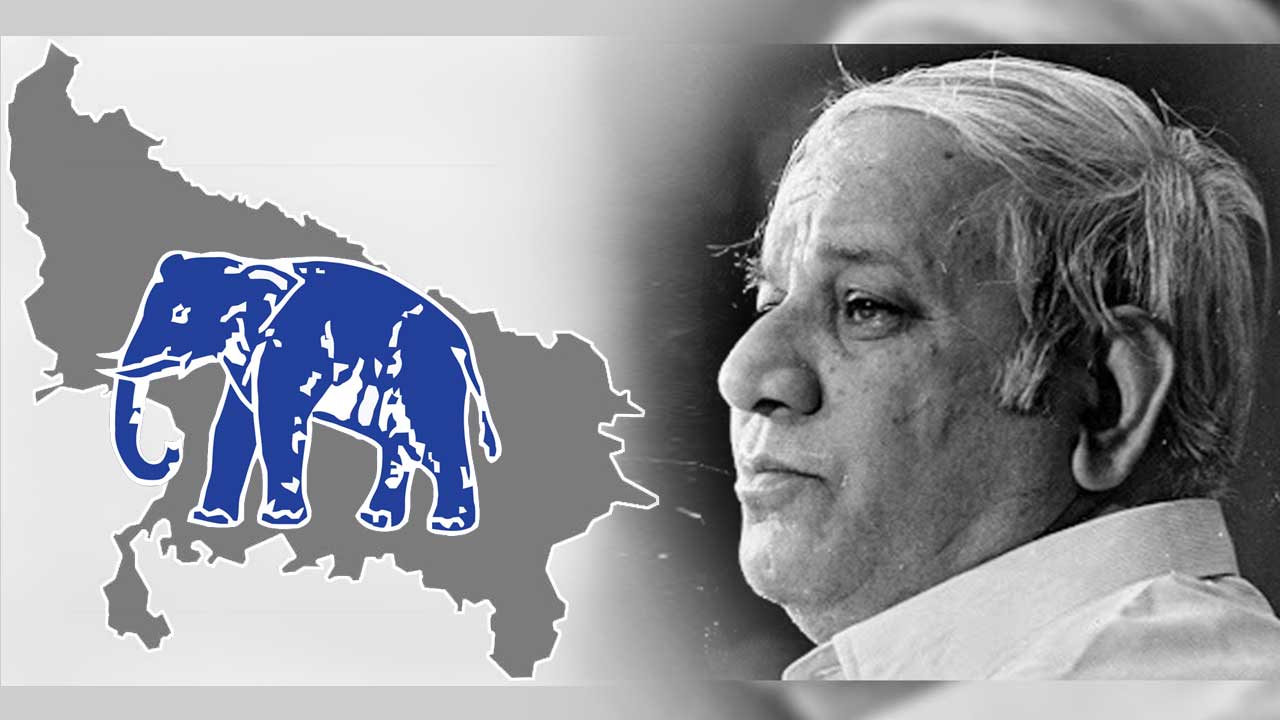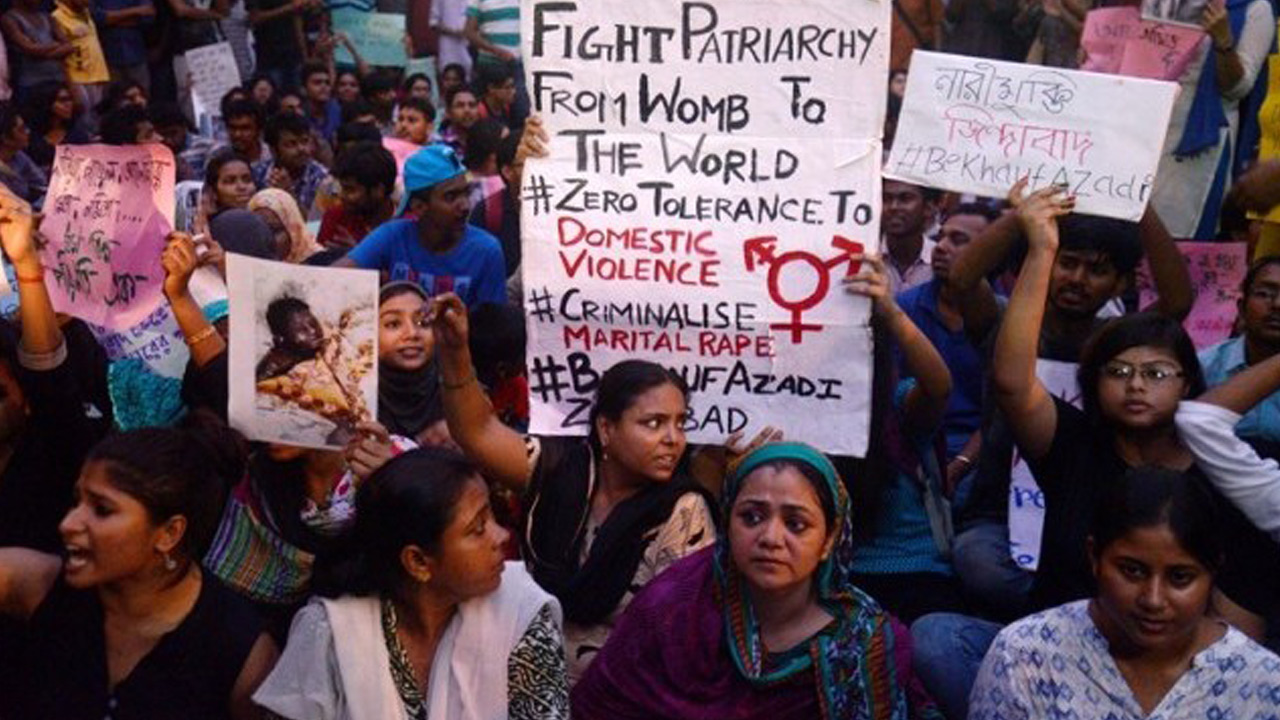In the early Nineties, Madhya Pradesh’s Sunderlal Patwa-led BJP government established the Makhanlal Chaturvedi National University of Journalism and Communication to train journalists of RSS ideology. The majority of the students of the institution were steeped in the Sangh ideology, though those with alternative views too had a marginal presence. I attended the university in the year 1995-96. In those days, the university had a yearlong course for graduates.

Our batch had students from Bihar, Uttar Pradesh and Rajasthan. There were three of us from Bihar, four or five from Uttar Pradesh, one or two from Rajasthan and the rest were from Madhya Pradesh. Most of the students had an RSS background. Arun Bhagat was from Patna and was associated with the ABVP while Pawan Tripathi of Basti (UP) was an RSS volunteer. Pawan used to attend RSS shakhas in Bhopal, too. There were three leftists from Bhind and Morena. I was the only one who was neither a leftist nor a rightist. Though casteism was rampant on the campus, it had taken on the garb of ideology.
A couple of days into the academic year, my leftist batchmates were sitting in the canteen. I also joined them. My name was listed as Birendra Kumar in the merit list. “Birendra ji, you are from which caste?” they asked. “I am a Yadav”, I replied. Then we talked about other things.
It was the beginning of the course and hostel rooms were being allotted. Arunesh Kumar was also from Bihar. He could not a get place in the hostel. “We wear thick bands around our necks, so Singh sir thinks we are Ahir-Ganwars. That is why he is not giving us hostel accommodation ,” he said. I asked him, “Which caste do you belong to?” He said, “Brahmin.” I told him that he could not be a Brahmin, as all Brahmins from Bihar used their surname. However, he insisted that he was one and told me his father’s name – one Jha.
Arunesh told Arun Bhagat that I had asked him his caste. Arun took no time in broadcasting to everyone and his uncle on the campus that I was casteist. Within a week, it was confirmed that I was rabidly casteist. Having acquired this reputation, I decided to strengthen it. I subscribed to the magazine Yadav Jyoti and had it send issues to my university address.
Months went by. We were now closely acquainted with each other. One day, we were sitting at the home of Sadhna Pathak, located close to the campus. Arti Pandey, her classmate, was also there. During the conversation, Sadhna asked, “Which caste does Arun Bhagat belong to?” I pretended that I did not know. Arti then said, “Bhagat ji is a Bania.” She told me that Bhagat himself had told her this.
The next day, I happened to meet Bhagat. I told him, “I asked Arunesh his caste and you branded me casteist. When Arti Pandey asked you your caste, why didn’t you do the same to her? Do you have the courage to say that Arti is casteist?” He had no answer. That conversation had an impact on Bhagat. I could not continue my studies after graduation but Bhagat joined the masters in journalism (MJ) course. Meanwhile, I began working in a magazine called Vichar Mimansa in Bhopal. One day, when I was on the campus, someone asked Bhagat his name. He reply was elaborate: “My name is Arun Bhagat and I come from the Vaishya caste.”
Struggle becomes wider

In the university, the leftists were dormant whereas the Sanghis were hyperactive. They had their own network. Arun Bhagat had literary leanings. In Patna, he had been active in literary gatherings and continued to be so in Bhopal. Pawan Tripathi was quite well known in the RSS circles. Though I had no ideological association with the Sangh, I was close to Pawan. Whenever he visited the Sangh’s office “Samidha” and the state BJP office, I too tagged along. Once or twice, I also went to an RSS shakha with him and developed a rudimentary understanding of the Sangh jargon, besides learning how to salute the RSS flag.
At Samidha, I got to meet many top office-bearers of the Sangh, including K.S. Sudarshan, Kushabhau Thakre and Suresh Soni. Prabhat Jha was in charge of the state BJP office. He was from Bihar and had settled in Gwalior. Because of him, I started visiting the BJP office. Jha became a member of the Rajya Sabha later. Anil Saumitra of the Vishwa Samvad Kendra was also from Bihar. Though I had no ideological affinity with the Sangh, I got an opportunity to know Sangh activists well. Babulal Gaur was a senior BJP leader at the time. As he was a Yadav like me, I became close to him. He later became the chief minister.
My network in the Sangh circles gradually widened. It came in handy later. At that time, Pawan was given some responsibility related to the media in the BJP office. Both of us went to meet Prabhat Jha. He told us, “Those in charge of the media should ensure that the party gets the maximum space in newspapers. Whether the news is positive or negative, doesn’t matter.” He also gave some examples to make his point.
Social network gets stronger
Vinay Singh was from Gorakhpur. He was also in our batch. He was associated with the ABVP but he was more sober than most ABVP activists. I used to respect him a bit more than the others. He was very amiable. The Sangh lobby began trying to ideologically associate me with the Sangh. It had a sizeable presence in my batch. My circle in the Sangh began widening. I also started attending the programmes of the Sangh and the BJP but I could never bring myself to accepting their ideology.
We had a strong social network too. Apart from Babulal Gaur, who was a senior BJP leader, Subhash Yadav was the deputy chief minister and Laxmi Narayan Yadav – who was to Sharad Yadav – was a senior leader. I met all of them. While conversing with these leaders and at the functions of the community, we also talked about caste and society and about getting our due share in organizations and in state power.
 Besides students, many teachers in the university were also from UP and Bihar. One of them was Dr Shrikant Singh. He was from UP but had taught in a college in Bhurkunda (now at Jharkhand). He was sympathetic towards students from Bihar. Initially, I did not get a room in the hostel. I met him, as was in charge of the hostel. He was very gracious and told me that he was there to help Biharis. Within a day or two of meeting him, I got hostel accommodation. I had also taken along the clippings of some of my published news items and features. After reading them, he told me, “You favour Lalu Prasad too much.” I was happy that what I was able to communicate to readers what I wanted to tell them. This is what journalism is all about.
Besides students, many teachers in the university were also from UP and Bihar. One of them was Dr Shrikant Singh. He was from UP but had taught in a college in Bhurkunda (now at Jharkhand). He was sympathetic towards students from Bihar. Initially, I did not get a room in the hostel. I met him, as was in charge of the hostel. He was very gracious and told me that he was there to help Biharis. Within a day or two of meeting him, I got hostel accommodation. I had also taken along the clippings of some of my published news items and features. After reading them, he told me, “You favour Lalu Prasad too much.” I was happy that what I was able to communicate to readers what I wanted to tell them. This is what journalism is all about.
Purushottam Kumar was also from Bihar. He was my senior and was pursuing his MJ. The MJ students were not entitled to hostel rooms and had to look for accommodation in the city. He approached many house owners but his caste came in the way. He told me that a landlord asked him his caste. When the landlord heard “Bhumihar”, he asked, “What is this caste?” Purushottam said that in Bihar, Bhumihars were considered equivalent to Brahmins. But the landlord was not convinced and refused to rent out a room to him.
Buffet
The campus of Makhanlal was in Trilanga. A two-storey building housed the office. Buses were available for the railway station from there. Bhopal has an excellent public transport system. Only passengers are allowed to board the buses only if they can be seated. No one had to keep standing in the buses. The hostel was also in the office building – boys’ hostel on the lower floor and girls’ on the upper. The top floor housed the offices of the vice-chancellor and the registrar. The mess was excellent. In those days, the university only offered courses in journalism, public relations and library science.
Kamal Dixit was the head of the journalism department. Dr Shrikant Singh also taught journalism. There were many visiting professors. Press Information Bureau’s Anil Saxena also visited. Senior students taught us. The atmosphere was academic. I read a lot during my time in the university but my reading was limited to whatever was required for the course. I had little interest in literature and wasn’t drawn to any ideology. I read some books on politics, though. While studying, I also began visiting offices of newspapers. By and by, I began writing. I opened my first bank account to deposit the cheque that I received for an article that was published.
It was in Makhanlal that I came to know what air-conditioning and buffet were. All the students had gone to the State Administrative Academy to attend a function. It was then that I sat in an air-conditioned hall for the first time. I could not understand what it was. During a conversation, I came to know that it was a thing that kept a room cool. That was also my introduction to the buffet – to each his own plate, to each his own choice. Along with the others, I too joined the queue. We were crawling forward. I looked at what the person ahead of me was doing and imitated him. Eating with one hand while holding the plate in another was a complicated task. I hesitated before I went for my second helping because my hands had food all over them. But soon, I adjusted myself to the situation.
At the university, I heard senior journalists and famous litterateurs speak. Senior journalists visited from time to time to share their experiences, so did writers. I had no interest in writers, though I made it a point to attend the lectures of journalists. The university administration did not want any student to work for a newspaper. That was to shield them from the disappointment and frustration over low pay in newspapers. That could have cut short their journalistic careers, or so the administration believed.
Kept my father’s faith

I had started writing features for newspapers long before joining Makhanlal. We also had long arguments over what makes news. What is news? What is the intro? What is the body? All this was important but more important was the angle of the news. It is the angle that separates one journalist from another. Otherwise, all report the same incident. We were told to go through the reports of one incident in different newspapers and to compare them – to find out why a news item was good and why another one was bad. We were also asked to conduct surveys of news.
I enjoyed reading the editorial page more than the news pages. Generally, the editorial is carried in the middle pages of the newspapers and it reflects the newspapers’ stand on issues. I also liked writing letters to the editor and writing features. I wrote a lot for Dainik Nai Dunia. Once, the university took us on a tour. We went to Mount Abu via Gujarat. We visited several places in Gujarat, including the Amul plant and the famous temples of Gandhinagar. In that week-long tour, I learnt a lot.
We were asked to publish handwritten newspapers for a week. We were divided into several groups and a member of each group was designated the editor for the day. Each time an edition was complete, it was dissected in terms of news selection and other aspects. We were told at the time that the newspaper sold because of the news it carried but ran on advertisements. That is why in the newspaper templates, the space for advertisement is fixed, and the remainder is earmarked for news.
During my year-long stay in Makhanlal, I learnt many new things – from ideology to the lack of thought, from politics to society. For the first time, I lived amid people from several states. I tried my best to be on good terms with them.
I was always short on money, so I never spent on anything unnecessary. Due to the poor economic condition of my family, I could not pursue MJ. I started working after completing my BJ. When I was selected for Makhanlal, my father was very worried. He did not how he would arrange the money for my stay and study in Bhopal. I assured him that he would have to spend money only for a year; thereafter I would not demand anything from him. My elder brother said that he would fund my studies and that I should go and enrol myself. I did and after a year, returned home.
Once I got my final examination results, I decided to leave for Bhopal to work there. Again, I had to ask my father for money. He gave me Rs1000 and told me that since I had already wasted so much money, I could waste a little more. After reaching Bhopal, I contacted the editor of Vichar Mimansa. He agreed to hire me. I’ve been a journalist since that day. In the years gone by, I’ve had to face challenges like all the other scribes. But I am glad that I did not have to go back to my father for money once I returned to Bhopal after being awarded my degree. Now, of course, my father is no more.
For a detailed exposition of the concept of Bahujan literature, read Forward Press Books’ Bahujan Sahitya Ki Prastavna.
Contact The Marginalised Publications to order a copy; phone: 9968527911, email:themarginalisedpublication@gmail.com
The English edition of the book is titled The Case for Bahujan Literature, which is also available with The Marginalised Publication.
To order the books on Amazon, click here and here.
For the e-book version, click here.





